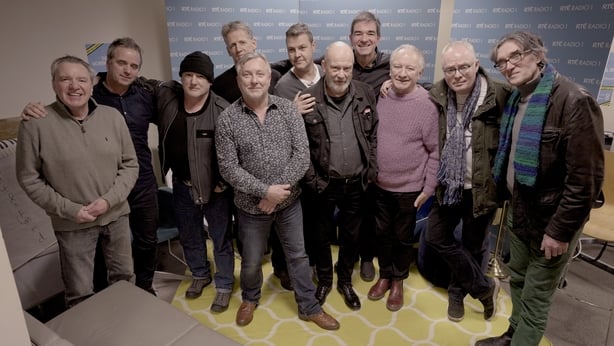Moving Hearts founded in 1981, the year of the hunger strikes. The early 1980s was a turbulent time, scarred by the horrible atrocities of the Troubles, punctuated by multiple general elections and innumerable strikes, and soundtracked by some fantastic music.
This trailblazing act were one of the very first Irish folk artists to fully embrace the possibilities of playing electric instruments, infusing their music with elements of jazz and the rebel spirit of rock n' roll.
Donal Lunny and Christy Moore started working on some songs that they felt didn't suit Planxty, their revolutionary folk group that turned Irish traditional music completely on its head during the 1970s.
They initially planned to test material as a trio with guitarist Declan Sinnott, but the nascent band ended up swelling their ranks to include Keith Donald on alto sax, Eoghan O'Neill on bass, Brian Calnan on drums, and Davy Spillane on uilleann pipes.
We need your consent to load this rte-player contentWe use rte-player to manage extra content that can set cookies on your device and collect data about your activity. Please review their details and accept them to load the content.Manage Preferences
Listen: Moving Hearts talk to RTÉ Arena
This expanded group fine-tuned their repertoire at a fabled residency at the legendary Baggot Inn, Dublin, where they played every Monday, Tuesday, and Wednesday. Eamonn McCann subsequently called these shows one of the greatest residencies in musical history, likening this career-defining stint to The Rolling Stones' career-making stint at London's Crawdaddy club.
They made a seamless transition from the stage to the studio. Their 1981 debut album opens with one of their best-known tunes, Hiroshima Nagasaki Russian Roulette, a ballad by American songwriter and activist Jim Page about the Cold War and the nuclear threat that hung over the era like an anxious cloud.
Listen: Moving Hearts - Hiroshima Nagasaki Russian Roulette
It is immediately followed by Irish Ways and Irish Laws, a song written by John Gibbs documenting the tribulations of the Viking invasion, Oliver Cromwell, the plantations, and the tragic course of Irish history, repeating the line, "villages of Irish blood waking to the morning." This self-titled debut album also features songs by Jackson Browne, Jack Whiteshaw, and Philip Chevron.
Dark End of the Street followed in 1982, a year when both Charlie Haughey and Garrett Fitzgerald served as Taoiseach, but certainly not part if any rotating leadership agreement. Moore left the band to concentrate on his burgeoning solo career.
Their third completely instrumental album, The Storm, followed in 1985, which they focused upon when they reformed in 2007. They’re now poised for another outing in the 21st century.

Moving Hearts first joined forces with the RTÉ Concert Orchestra in March 2020 for a special St. Patrick's Day broadcast. Of course, Covid shelved any initial plans to follow this with live shows. Finally, this unique collaboration comes to the Bord Gáis Energy Theatre stage this St. Patrick's weekend.
The band’s line-up in 2023 includes some of Ireland’s finest musicians, namely Donal Lunny, Davy Spillane, Keith Donall, Eoghan O’Neill, Noel Eccles, Anthony Drennan, Liam Bradley, Graham Henderson, and Mick Hanly.
It promises to be a spectacular celebration of Irish music, deftly combining the musical innovation of Moving Hearts with sumptuous orchestral arrangements under the baton of Gavin Maloney to breathe new life into this timeless music, which was born during some of the darkest days of this country’s history.
Moving Hearts and the RTÉ Concert Orchestra play the Bord Gáis Energy Theatre, Dublin on March 17th and 18th - find out more here.


